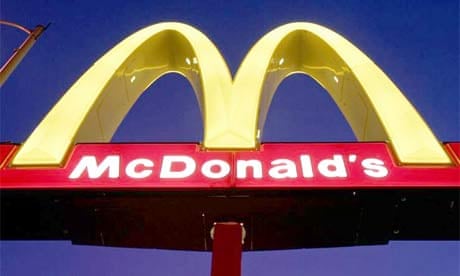McDonald's tried to delay the US government's implementation of a free-trade agreement in order to put pressure on El Salvador to appoint neutral judges in a $24m (£15.5m) lawsuit it was fighting in the country. The revelation of the McDonald's strategy to ensure a fair hearing for a long-running legal battle against a former franchisee comes from a leaked US embassy cable dated 15 February 2006.
Five days earlier, the firms's vice- president for government relations, Dick Crawford, and general counsel for Latin America and Canada, Maria Legett, had briefed the US ambassador on their efforts to get the case settled, using the Central America-Dominican Republic-United States Free Trade Agreement (CAFTA-DR) essentially as a bargaining chip. "They explained that the company has engaged in a Washington-focused advocacy effort to put pressure on the Salvadorans to resolve the case according to the rule of law, suggesting that CAFTA-DR implementation should be delayed pending resolution of the case," the cable says.
Ambassador Hugh Barclay argued strongly that what McDonald's was doing "ran directly counter to US interests in seeing CAFTA-DR implemented as soon as possible". Embassy officials also noted that McDonald's invocation of CAFTA-DR in the lead-up to legislative elections would play into the hands of those who have resisted CAFTA-DR by alienating senior government officials who are already working to see that the case is resolved according to the rule of law and by complicating efforts to get additional CAFTA-related reforms through the legislative assembly".The diplomats also argued that the tactic would thrust the case against McDonald's further into the limelight, attracting the sort of negative publicity they did not want. "Crawford acknowledged these concerns and agreed to tone down, but not cease, his company's efforts on this issue."
The case against McDonald's was a long-running and expensive problem for the burger giant. It had been brought by a former franchisee, Roberto Bukele, whose company had opened the first McDonald's in El Salvador in 1972. In 1996, Bukele lost his franchise. McDonald's suggested to the embassy that he had not complied with conditions attached to its renewal, which included remodelling the three restaurants he, by then, owned, using McDonald's-approved sources for food products, establishing a staff hiring and training plan, and obtaining corporate approval of new restaurant sites and new menu items.
Protracted legal action led to a ruling of the appeals court in 2005 that McDonald's had illegally terminated Bukele's contract. It awarded him $24m (£15.5m) damages for loss of earnings.
McDonald's filed an appeal to the supreme court, but Legett was not optimistic about the prospects for an unbiased hearing. "She suggested that a fair resolution of the case was unlikely given the current composition of the civil chamber," the cables says. "Two neutral judges have recused themselves based on previous involvement in the case. Judging from her case record on the bench, the third judge, an FMLN partisan, will rule against McDonald's regardless of the merits of the case. McDonald's is seeking to have this judge removed, and three substitute judges named. McDonald's has filed a motion to have the FMLN-linked judge recused from the proceedings on the grounds that her well-documented anti-Americanism will prevent her from hearing the case impartially."
McDonald's lawyers said they would pursue every legal means to get a fair hearing, lobbying local businessmen and government officials to try to persuade Chief Justice Agustin Calderon to name three impartial judges to the civil chamber to hear the case.
The ambassador told McDonald's representatives that he had already raised the issue with President Saca, "emphasising the stakes at play for a government in desperate need of foreign investment".
He said he thought the government was interested in settling the case fairly and promised to continue raising the issues as appropriate.
McDonald's denies it had wanted to delay implementation of the free trade agreement. "Our purpose was to raise awareness of our concerns with the rule of law in El Salvador and our lawsuit specifically," said a spokesperson. "We had no interest in delaying CAFTA. Our hope was that our legal issue could be included in the CAFTA discussions already taking place between the two governments at that time. It's important to note we would have engaged with the US embassy under any circumstances regarding our case."
